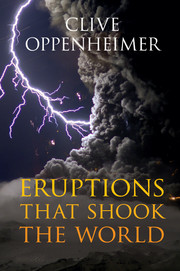Book contents
- Frontmatter
- Contents
- Preface
- Acknowledgements
- 1 Fire and brimstone: how volcanoes work
- 2 Eruption styles, hazards and ecosystem impacts
- 3 Volcanoes and global climate change
- 4 Forensic volcanology
- 5 Relics, myths and chronicles
- 6 Killer plumes
- 7 Human origins
- 8 The ash giant/sulphur dwarf
- 9 European volcanism in prehistory
- 10 The rise of Teotihuacán
- 11 Dark Ages: dark nature?
- 12 The haze famine
- 13 The last great subsistence crisis in the Western world
- 14 Volcanic catastrophe risk
- Appendix A Large eruptions
- Appendix B Further reading and data sources
- References
- Index
13 - The last great subsistence crisis in the Western world
Published online by Cambridge University Press: 01 June 2011
- Frontmatter
- Contents
- Preface
- Acknowledgements
- 1 Fire and brimstone: how volcanoes work
- 2 Eruption styles, hazards and ecosystem impacts
- 3 Volcanoes and global climate change
- 4 Forensic volcanology
- 5 Relics, myths and chronicles
- 6 Killer plumes
- 7 Human origins
- 8 The ash giant/sulphur dwarf
- 9 European volcanism in prehistory
- 10 The rise of Teotihuacán
- 11 Dark Ages: dark nature?
- 12 The haze famine
- 13 The last great subsistence crisis in the Western world
- 14 Volcanic catastrophe risk
- Appendix A Large eruptions
- Appendix B Further reading and data sources
- References
- Index
Summary
Its noise reverberated loudly
Torrents of water and ash descended
Children and mothers yelling and screaming
Believing the world had turned to ash
At first it seemed Allah was angry
At the deed of the King of Tambora
In shedding the blood of a worthy pilgrim,
Rashly and thoughtlessly
From an epic poem (syair) from Sumbawa, compiled in Malay around 1830 [239]In Western Europe, 1816 was a time of optimism. The Napoleonic wars, which had ravaged the continent, were over. Unfortunately, a little known volcano on the island of Sumbawa in Indonesia had erupted the previous year and its impacts were about to be felt across the northern hemisphere …
Tambora, on the Indonesian island of Sumbawa, may once have been the highest peak of the East Indies as they were known in the colonial period. Sailing eastwards past Bali, it appeared as high on the horizon, despite being further away, as the 3726-metre-high Mt Rinjani on Lombok Island, suggesting it may have reached over 4000 metres above sea level. We shall never know for certain because the cone was toppled in April 1815 by the largest eruption of recorded history. The events also resulted in the greatest-known death toll attributable to a volcanic eruption [18], and the associated climate change has been implicated in ‘The last great subsistence crisis in the Western world’ (see Further Reading).
- Type
- Chapter
- Information
- Eruptions that Shook the World , pp. 295 - 319Publisher: Cambridge University PressPrint publication year: 2011



